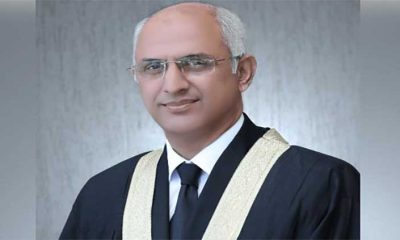Finance Minister Ishaq Dar said on Saturday the 2023-24 budget focused on economic growth and was thus different from the traditional documents.
Addressing the post-budget press conference in the federal capital, Dar, in response to a question, said the government was working on a “Plan B” if the International Monetary Fund (IMF) did not release the pending loan.
He, however, avoided to explain or share any details, saying, “Plan-B is always there”. He stated that the features of the plan could not be talked about in public and again reiterated that Pakistan would not default.
Read more: Exchange of fire: Miftah says budget isn’t sustainable, Dar ridicules default mongers
Meanwhile, Dar was still hopeful that Pakistan would pass its next IMF 9th review, but that he “didn’t think” it would clear reviews beyond that under the current programme.
Listing the long-term government objectives, Dar said the aim was to reverse all the economic losses suffered during the previous year. “Our first objective is to go back to achieve 2017 economic indicators,” he said, adding that Pakistan had faced deep economic vulnerability, which it had successfully overcome, resulting in a halt to any further decline.
Dar said allocation had been made in the budget for holding general elections in the country, but he wasn’t the chief election commissioner to tell when the polls were to be held. Elections should be held on time, the finance minister noted.
Expressing his views and answering different questions, Dar said Pakistan had achieved economic stability and increasing the growth rate was the next step, as he noted that the PTI chairman was responsible for political and economic uncertainty in the country.
He said the projection of 3.5 per cent economic growth for the next fiscal year was a realistic. The target was on the lower side, but added that there was no more room in the budget to reduce the fiscal deficit target by any further.
The minister said that the government had no plans to reschedule its debt to Paris Club creditor nations or to seek haircuts on its debt.
Dar said inflation would stay at 21 per cent in the next fiscal year [2023-24] while the government expenditure was estimated at Rs14,040 billion.
He stressed the need for making Pakistan an economic power and noted that the private sector could play a pivotal role for achieving the goal. Only development could lead to generating employment opportunities for people, the minister added.
About the agriculture sector, Dar mentioned withdrawal of duty on seeds and machinery besides allocation of Rs6bn to subsidise the fertilizer prices and Rs10bn under prime minister’s programme as the important measures to boost the sector by increasing the produce and improving the lives of farmers.
The finance minister was confident that the country would move forward towards achieving food security with the increase in productivity by implementing the measures suggested by the government.
An amount of Rs35 billion as subsidy had been allocated for basic food commodities including wheat flour, ghee and lentils in the budget, which could be availed at utility stores, he told reporters.
According to Dar, fiscal deficit is estimated at Rs7.57 trillion – 7.1pc of GDP – for the upcoming year, which is the highest in history. It was Rs6.4tr recorded during the current fiscal year. However, it will be partially offset by an anticipated Rs650bn provincial cash surplus, bringing the consolidated deficit to Rs6.9tr or 6.5pc of GDP.
Moreover, interest payments, or debt servicing, budgeted for the next fiscal year has increased by a whopping 85pc from last year to Rs7,303bn — accounting for 55pc of total current expenditure — making it the single largest expenditure of the government.
He said new taxes worth Rs200 had been imposed in the next budget while the collection through the petroleum levy was estimated to Rs875bn.
The advance tax on a cash withdrawal of Rs50,000 or more during a day was designed to bring the non-filers into the tax net, the minister explained.
About the tax collection, he said the target set for the next year was Rs9.2tr – a 23pc increase when compared with 2022-23.
When asked about the earlier proposal to provide petrol to the vehicles of 800cc or less capacity at a cheaper rate and whether if it has been discarded, Dar said the move had nothing to do with budget as it was pricing issue. The government had not gone for the move so far because some quarters were unable to digest that, he remarked.
In other words, what the finance minister wanted to say was that the move is still under consideration but he pointed to some hurdles or objections without naming anyone.
He said there was a need to reform the power sector which remained a significant stumbling block in the talks with the IMF.
During the press conference, the minister pointed to the government emphasis on renewable energy and mentioned that the prices of solar panels would be reduced in the country after the withdrawal of different duties.
During the press conference, the minister pointed to the government emphasis on renewable energy and mentioned that the prices of solar panels would be reduced in the country after the withdrawal of different duties.
The statement comes as the Sindh Assembly on Wednesday passed the Sindh Regulation of Electric Power Services Bill 2023 under which a power generation, transmission and distribution authority would be established in the province. It will also have the power to determine electricity tariff.
It is a huge progress given that the provincial governments are authorised to regulate electric [and even gas] services after the 18 Amendment. However, they had been reluctant to accept the responsibility until recently.
Meanwhile, the move would help curb line losses and power theft as the provinces, unlike the past because of being federal subject, won’t hesitate using law to punish the culprits.
Post Views: 82


 Sports3 months ago
Sports3 months ago
 Fashion2 months ago
Fashion2 months ago
 Sports3 months ago
Sports3 months ago
 pakistan3 months ago
pakistan3 months ago
 World2 months ago
World2 months ago
 pakistan3 months ago
pakistan3 months ago
 World2 months ago
World2 months ago
 Sports2 months ago
Sports2 months ago






















